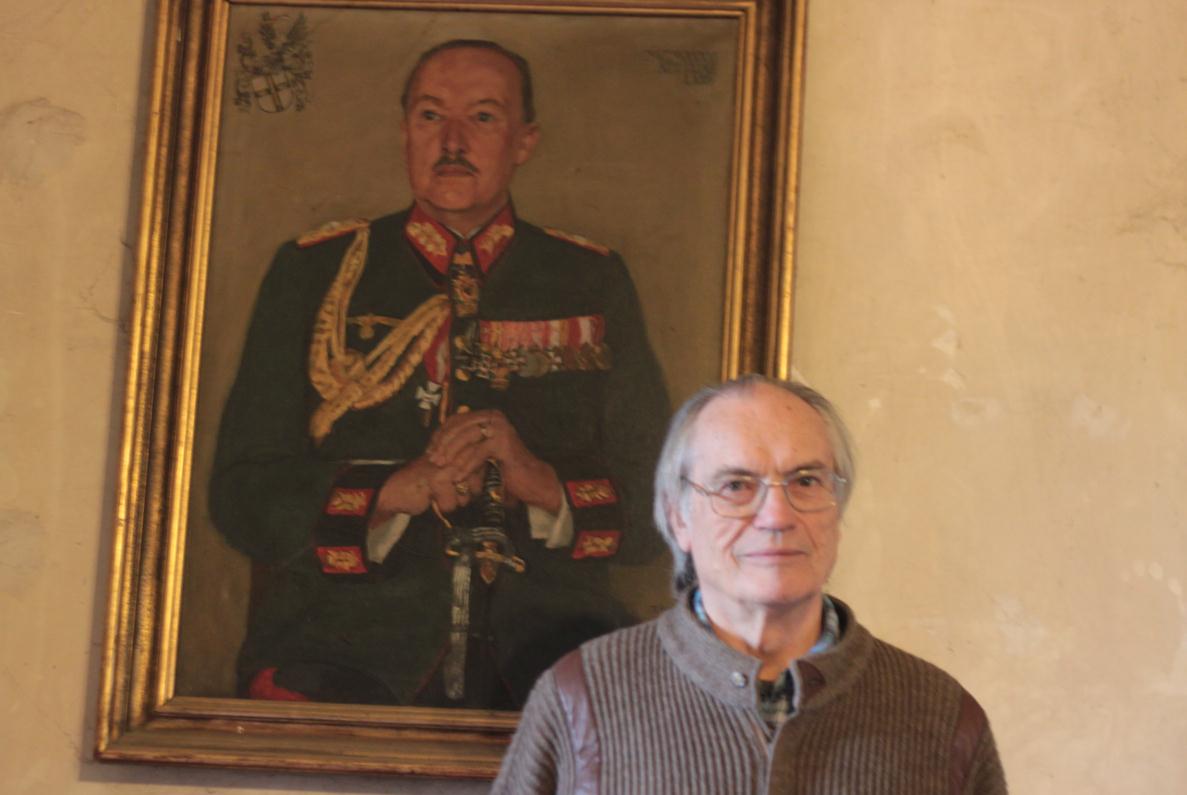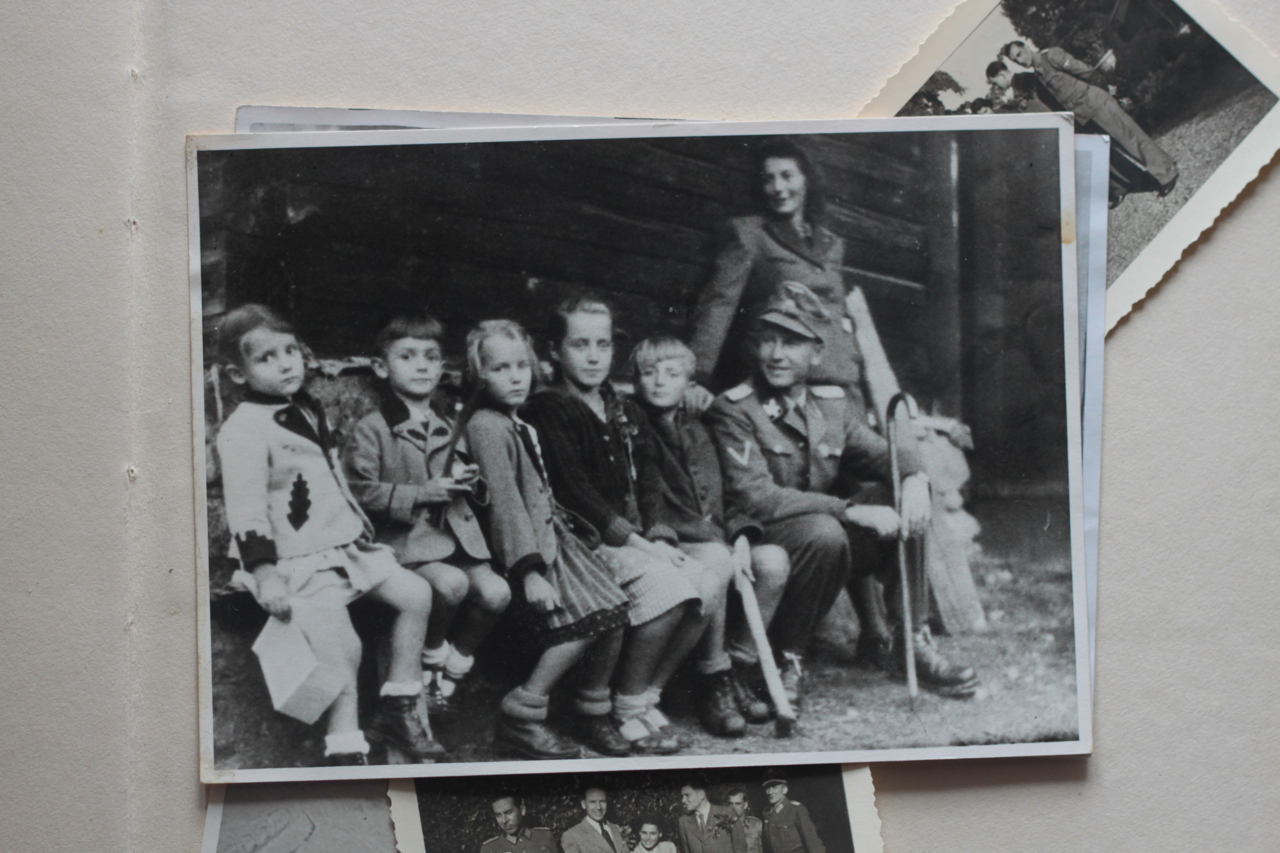
Click on the image to get all articles
The train from Vienna to Frättingsdorf swings gently along the tracks, cradling sleeping passengers. In a cold April morning, which still bares the reminiscences of a winter that was out of the norm, the wagon’s heating generates an irresistible torpor. Through the wide window, the farms and their stone houses multiply endlessly. The journey, in this slow motion sensation, takes about an hour.
Punctually at 9:42 a.m., Horst von Wächter parks his car in front of the station. The castle where he lives in the village of Hagenberg is four miles away, in the deep silence of Austria’s countryside. Without descending, he opens the passenger door and receives Opera Mundi’s journalist with a piercing question: “So you want to know more about my father? Why?”
Distrust is inevitable. Horst von Wächter, 74, is the fourth of six children born to Otto Wächter, a Nazi Austrian commander of the SS, Adolf Hitler’s high ranking paramilitary troop. His father was governor of the district of Krakow, Poland, and of Galicia, today northwest Ukraine, during the German invasion in World War II. He’s one of the people directly responsible for the construction of the Krakow ghetto and he ratified the use of gas chambers to kill Jews. A fugitive, he was not tried at Nuremberg despite having been mentioned several times.
Regardless of his key role in the World War II, there is little or nothing about Otto Wächter in the Austrian State Archives and in the folders of the Berlin Document Center, which gathers millions of papers on Nazism. The man who tried to hunt him down after the war, Simon Wiesenthal, considered him “the most hated among all Nazi fugitives”, but managed to compile only a single folder, today part of his archives, in Vienna.
With so little explained, Horst was prepared to talk openly about his father. His recent openness in addressing the issue – he has been studying the family history during the past few years – is extremely rare among children of prominent Nazis. His effort, he says, is to do “justice” to his father, “fix” errors in his biography and relativize the crimes he committed, separating the SS’ actions, responsible for the Holocaust, and the civil administration of the invaded territory.
At ease in his bedroom in the Hagenberg Castle, Horst revealed in an exclusive interview, unprecedented events of his father’s life, reported dead in suspicious circumstances in 1949 (read here Otto Wächter’s profile). Like other high-ranking Nazis, such as Adolf Eichmann, Franz Stangl, and Josef Mengele, Wächter studied an escape to South America and considered Brazil to be his best option. A letter, dated May 10, 1948, to which Opera Mundi had access (read more here), proves the attempt to emigrate.
The interview has two parts. In the first, Horst talks about the political career of his father, defined by his adherence to the NSDAP (the German Nazi Party) in 1923 and by his direct participation in the Putsch (coup d’état) in Austria in 1934. The second part deals with aspects of the SS general’s personal life until he was presumed dead in Rome, hidden behind a false identity, supposedly in the arms of Bishop Alois Hudal, notorious for harboring and facilitating Nazis’ escapes.
Part 1 – Nazism and war
Opera Mundi: Sir, you said you wanted to “fix” your father’s history. What does that mean and what exactly would you like to fix?
Hosrt Wächter: I want to do him justice. I want to clarify who he was, what his personality was like and why he acted like he did. It is for things to be understood, you know? This is a picture of my grandfather [he points to a picture of Josef Freiherr von Wächter, Otto Wächter’s father, beside his bed], who was a very highly decorated officer in World War I, and was also [Austria’s] Minister of Defense. He was one of the 30 most decorated war officers. These people wanted to do good for others. They are not what everyone says today of the Third Reich, that everyone in the SS were criminals [the SS was banned from Germany in 1945 and classified as a criminal organization at the Nuremberg Trials], which cannot be true. There are always people who want to do the best, just do their job.
OM: Your father was a member of the Nazi party from the beginning.
HW: Yes, he first became member of the SA [Hitler’s first paramilitary army, in 1923]. But the most important event in my father’s life was the World War I. His family was from Bohemia, where there was a strong nationalist opposition between the Germans and the Czechs. He finished school in Budweis in the south of Bohemia, where there was a German school, and he became part of this conflict when he was young. He was trying to do something and solve problems. Then he, of course, entered the nationalist movement at its beginning. It was through sport. My father was an athlete, he was the Austrian rowing champion in the 1920’s. He did not come from the university. Many came from this side [academic], but he came from sports.
OM: Do you, sir, have details about what happened to him in that period? About his political views or his political participation?
HW: There was a German sports club – and everything had to be German. Not so much Austrian, but everything was based on “being German”. In fact, Austria was forced into independence after World War I, actually, because everyone wanted to join Germany. That was the big dream: the reunification with Germany. So he saw with good eyes the Anschluss [annexation of Austria in 1938], because that's what people dreamed of. They wanted to be part of the “great German nationality”, and it happened. But there were Hitler’s ideas about – especially – the Slavs, the Czechs, whom he treated as Untermensch [subspecies]. They were not “at the level of” the Germans and this was the reason why the war went wrong. I'm sure that the Soviet Union would have fallen 50 years earlier if the Germans had understood the situation and sought Ukraine’s and other eastern nations’ independence. It's what they expected, to be released from the communist regime. My father always maintained that it was necessary to respect people and never treat them like animals.
OM: Your grandfather and your father had a career in law.
HW: Yes, my grandfather became [Austria’s] Minister of Defense in 1921 – since 1890 he was member of the Großdeutsche party [Volkspartei, an extinct Austrian nationalist party]. That's when they moved to Vienna and he became a lawyer. And of course, with its connection to nationalism, he began defending the Nazis in the courts. My father was also graduated and became what is classified as “independent counsel” [between 1932-1934]. In Vienna, he met a group of people who were working to force Austria to become part of Germany. [He later became lawyer of the Nazi party and the SS].
Roberto Almeida/Opera Mundi

Inside the castle, Horst keep pictures not only from his father, but also from his grandfather
OM: Your father was the general governor of Krakow. What needs to be “corrected” in the current version of his administration’s history?
HW: Today people no longer make distinctions between the civilian government and the SS. They say that the civilian government was responsible for what happened there by the hands of the SS. This is a big misunderstanding. He lived in infighting. It should be stated that there was this dualism, proposed and signed by Hitler. When he set the legal basis for establishing the general government, he said that there would be a civilian government and the police, which was not subordinate to the government. The police was independent. Therefore, there was infighting practically every day. And that’s also why my father has this bad criminal reputation. He died in July 1949. The date of his death is always placed wrong. In September 1949 a female journalist in Rome found out about his death. Newspapers, with big headlines put it as if he was the “killer of [Engelbert] Dollfuß [Austria’s chancellor, assassinated in the 1934 coup attempt].” Then there was a sequence of three days of headlines in Viennese newspapers. This created his bad reputation and so he was always treated as a criminal.
OM: But your father was also responsible for the decision to use gas chambers to kill Jews. How do you see this fact, sir?
HW: My father’s main reputation is directly related to Simon Wiesenthal. Because Wiesenthal wrote that he saw my father on August 15, 1942 in Lemberg, when he and his mother were put on the train. He also wrote [in the book The Murderers Among Us] that my father sent 800,000 Jews to the gas chamber and that he was the most hated man among all Nazis. But I can prove that he was not in Lemberg on this date. I have a letter he wrote to my mother on the 15th, in which he was at a party meeting in Krakow. He was not in Lemberg. Simon Wiesenthal mistook him for Fritz Katzmann, who was the head of the SS in Lemberg. He made that mistake because my father used to wear SS’s uniform, because in that uniform he would have more authority. This is also mentioned in [Hans] Frank’s diary [the general governor of the invaded territories]. That is, he is completely wrong. The problem is that Simon Wiesenthal said this and it is very difficult to contradict him.

NULL
NULL
OM: Where were you, sir, and what did it feel like to hear Wiesenthal’s claims?
HW: I didn´t get too caught up in it. I thought I needed to get older. But I always had a bad feeling about Simon Wiesenthal. I have 800 letters exchanged between my parents, very important letters. What I want to prove is that he was totally against the SS. He was against it, despite wearing the SS’s uniform.
OM: So he had enemies in the SS?
HW: There was his superior, [Friedrich-Wilhelm] Krüger, in Krakow, [SS’s] chief in the general government, who tried to eliminate my father.
OM: Politically or physically?
HW: He wanted to send my father to the Waffen SS [Hitler’s elite troop], it was like a suicide squad, given the number of deaths. If he had joined the Waffen SS, he would surely have died. After that, my father was responsible for setting up Ukrainian divisions, and after Stalingrad [the battle lasted from August 1942 to February 1943] they changed … my father was also a close friend of [Andrey Andreyevich] Vlasov, you know? He was one of Stalin’s strongest generals who later tried to form his own Russian army to fight against Stalin himself. The Germans imprisoned him for about two years, until [Heinrich] Himmler [SS commander] understood that they wanted to fight the communists and could be able to help the Germans. Then, of course, my father became increasingly important, because he had connections with Slavic groups. He eventually became the chief of the Slavic division in the Reichssicherheitshauptamt [the Nazi intelligence service] in Berlin. He would oversee all the armies that fought on the German side.
OM: What was his main goal in this position?
HW: His goal was to build armies against Stalin. It was his idea, pretty simple. He began in 1943. Himmler was quite skeptical, but then they realized that there were many volunteers. Since my father was in the civil government, which had nothing to do with the army, he sought a political solution. If he could convince these people to fight against Bolshevism, they would have won the war. In May 1945, he left Berlin and joined the Ukrainian division in Austria. This division was the only one that was not given to Stalin by the people. He had connections and also priests. It was the only SS division that had its own priest. My father worked directly with Lemberg’s archbishop, who was a revered personality.
Arquivo Horst Wächter

Proud of his career, Otto Wächter uses military clothing even in family pictures, with his children
OM: Your father was in favor of a close connection with the Catholic Church.
HW: Yes, without a doubt. That’s why he managed for this division not to succumb to the treaty of Yalta [in 1945], which ordered for all soldiers to be handed over to Stalin. In Yalta, Stalin said he wanted my father’s division, since he considered it the most dangerous, with Poles and Ukrainians. The Ukrainians have always wanted to be independent from Russia, which eventually happened.
OM: Your father had an outstanding career in the Nazi party. The archives say he was quite expansive, proactive and had presence.
HW: He had good humor, left a good impression, had good manners. He was successful in the German character figure. He succeeded in convincing people. He was not a fanatic, a primitive.
OM: He was classified as “intelligent.”
HW: But not as an intellectual. He was a practical man. He succeeded in getting people to work fast and to find the best outputs. He was a very god state employee. In 1938 he told my mother, before entering the German government: “I can be a good lawyer and make lots of money or a good politician and try to do something for everyone in the country. What do I do?” Of course, my mother said that the choice was his; he could do whatever he wanted. But his political fate, of course, had been sealed since the Putsch [the Nazi party’s failed coup attempt in Austria in 1934] and he could never change or leave the political life to serve the law. I've been asked: Why didn’t he leave everything in Poland [because of the Holocaust]? [Ludwig] Losacker [his right-hand man] wrote that they felt responsible for the people there. And if they left the government, the SS would be stronger.
OM: How did he treat minorities? What Information do you have about it, sir?
HW: I have a letter from Lemberg, where he had a large house with servants. There was a cook who was a fanatical Nazi and cursed the Polish officials. They warned they would not work anymore because of her. My father tried to explain to her that you cannot treat people like that and that she should show superiority in work, behavior and in the quality of treatment she offered others.
OM: But did he do anything to defend these people as governor?
HW: He took severe measures against Jews in Krakow, to build the ghetto [in March 1941]. This bears his signature. Nobody knew how to find a solution. Nobody knew how things were developing. My father always thought he could find Hitler and convince him to change his policies.
OM: Are you refereeing to the Final Solution [extermination of all Jews], sir?
HW: Yes, with respect to Jews, Poles and all Slavs. Only afterwards he learned that there’s was nothing he could do. But he always said, “If I could go to Hitler and explain that this is wrong. That will bring us even more enemies. That we should treat these people as human beings”. He was sure that he could convince Hitler, but he was never received.
OM: So they didn´t ever meet?
HW: They met only during the Annexation of Austria [in 1938]. During the war, no. Not in the bunker, nor the headquarters.
OM: How do you see your father’s career today?
HW: I think he had no choice. He was born in this time of nationalist ideas, confusion, fanaticism. He, as a man who wanted to do something positive, change people, was automatically bound to take those steps that he took. He succeeded because his greatest enemies in the government, such as Krüger and Katzmann, were sent to other regions in 1943. He succeeded, but of course the whole thing had no future. Everything was doomed to collapse. The idea of nationalism and racial superiority is nonsense.
OM: What was the relationship like between your father and Heinrich Himmler, the head of the SS?
HW: Himmler was very impressed with him, his behavior and how he presented himself. With his character. Himmler was a bureaucrat, a kind of Schreibtisch (writing desk, in German). He was impressed by my father. It was Himmler who gave him his post in the SS. Himmler distributed these posts as gifts, to make the person dependent on him. He gave gifts to my father and, to all the children he had – the goal was to have the largest possible number of children – a medal . On the other hand, my father did not accept Himmler’s and SS’s politics, but he only managed to build the division in Ukraine because he had this direct contact.
OM: He was Himmler’s protégé.
HW: Yes, he was. When the Russians conquered Galicia and Krüger ordered my father to join the army, Himmler said: “No, Dr. Wächter will be sent to Italy.” That's because he was raised in Italian schools in Trieste, and spoke the language very well. He would be a part of the military government from August 1945.











































































